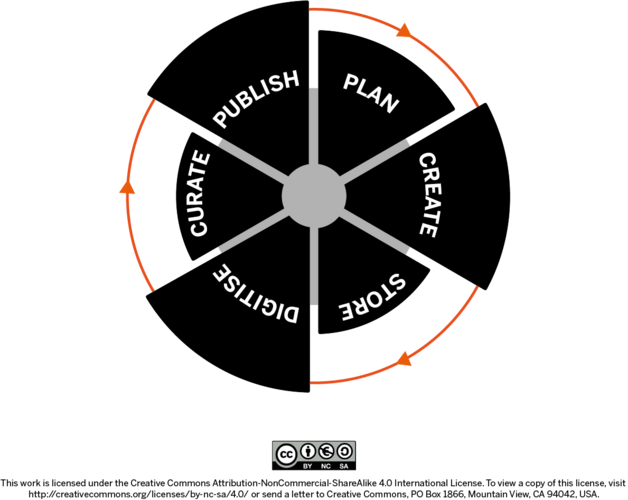Data Management
In the course of any artistic or academic practice, analogue or digital data is created that needs to be carefully organised. The sustainable handling of this data is very relevant for researchers and students alike. A forward-looking data management plan is essential for the sustainable success of research projects and is often also an important aspect in the acquisition of third-party funding. Sensitivity to self-determined handling of one's own data is also important for artistic practice and forms an important basis for the documentation of one's own work.
The data management of data created in an artistic-academic context can refer to various Open Research components.
The UdK Berlin Library focuses on individual data management consulting and information services.
A data life cycle encompasses the status of data in the various stages of an artistic and/or academic creative process. A forward-looking and sustainable approach to knowledge involves handling data according to its respective stage of development. When, how and whether data is analysed, published or archived is best determined early on in a so-called data management plan.
Data generated in the course of a academic and/or artistic creation process should ideally comply with the so-called FAIR principles. The word FAIR is an acronym of the definition.
"FAIR" data is therefore:
Findable – The corresponding data can be easily found by both man and machine.
Accessible – (Meta)data should be made easily available. This also includes the corresponding precautions in the area of long-term archiving.
Interoperable – The data should be available in a form that allows it to be linked to different systems, devices and applications.
Reusable – A correct description using appropriate metadata records and the clear allocation of a licence, for example, increase the reusability of data.
The FAIR principles represent the guidelines for making data reusable as part of Open Research. Find out more at go-fair.org.
Like the FAIR Principles, the CARE Principles are derived from an acronym.
Collective Benefit - The data should be usable by indigenous peoples.
Authority to Control - Individual and collective rights and interests of indigenous peoples in data should be taken into account.
Responsibility - The use of the data should be of collective benefit to indigenous peoples. For example, dignity must be respected when collecting the data.
Ethics - The rights and well-being of future indigenous peoples should determine the way in which data is handled.
The CARE Principles for Indigenous Data Governance were developed in 2019 in a workshop that took a critical look at open data development with regard to the rights and dignity of indigenous peoples.
The CARE Principles are intended to help take ethical or political issues into account when dealing with data and, in particular, to protect the interests of indigenous communities. Find out more on the Website of the Global Indigenous Data Alliance.
Sustainability
Working with data requires an awareness of sustainability.
The green data movement is dedicated to the central issues of environmentally friendly and resource-saving utilisation of data throughout its entire life cycle. The focus here is on the energy consumption of data centres as well as the materials of the hardware used.
The University Library therefore deliberately pursues the idea of shared infrastructures and the conscious use of individual solutions.
It also applies the sustainability aspect to the amount of data to be stored. What should be preserved for as long as possible and what is only needed temporarily? Long-term preservation in the form of long-term archiving must also be considered with regard to data formats.
The goal is a well-thought-out interplay of technical possibilities, academic and artistic requirements as well as the ecological impact with regard to the availability and subsequent use of data.

![[Translate to English:] FAIR [Translate to English:] FAIR](/fileadmin/_processed_/2/c/csm_FAIR_0d01141a04.jpg)
![[Translate to English:] CARE [Translate to English:] CARE](/fileadmin/_processed_/c/d/csm_CARE_7fde78cb4e.png)